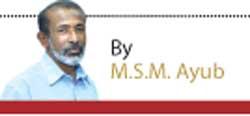31 Oct 2023 - {{hitsCtrl.values.hits}}
The Bill provides for the President to appoint an “Online Safety Commission” with wide powers to deal with internet contents
 The government is deserved to be commended if we can rely on the media reports that it has withdrawn the Online Safety Bill to refashion and present it again, since it has drawn much criticism from the local and international right groups. However, the very fact that an “Online Safety Act” is to come under the purview of the Public Security Ministry tells volumes and is questionable.
The government is deserved to be commended if we can rely on the media reports that it has withdrawn the Online Safety Bill to refashion and present it again, since it has drawn much criticism from the local and international right groups. However, the very fact that an “Online Safety Act” is to come under the purview of the Public Security Ministry tells volumes and is questionable.
This is the second Bill prepared by the government under President Ranil Wickremesinghe directly affecting freedom of expression of the people, apart from several other Bills and gazette notifications such as the Anti Terrorism Bill having meant to stifle the same freedom indirectly. Earlier in June this year the government was in the process of drafting a Bill under the name of “Broadcasting Regulatory Commission Bill” which drew flak from both locally and internationally.
The concerns on the part of media groups, civil society and the political parties about the Online Safety Bill were well manifested by the announcement by Speaker Mahinda Yapa Abeywardena on October 19 that 45 petitions had been filed in the Supreme Court against it.
Although much has been said about the Bill in media and in various other platforms, it is worth highlighting here at least a critically sensitive provision of it. The Bill provides for the President to appoint an “Online Safety Commission” with wide powers to deal with internet contents. And the President would be both appointing and removing authority of the members of the commission, meaning the members would be compelled to take decisions according to the likings of the President.
The Bill is being debated against a backdrop of the government having been compelled to withdraw several other bills and regulations with similarly apparent repressive motives. Justice, Prison Affairs and Constitutional Reforms Minister Wijeyadasa Rajapakshe presented in Parliament a piece of legislation called “Bureau of Rehabilitation Bill” on September 23 last year. Later, the Supreme Court ruled that the Bill would only be consistent with the Constitution if it didn’t affect ‘ex-combatants’, ‘violent extreme groups’, and ‘any other group of persons’ cited in the Bill. Interestingly, as if the government’s very target was those three groups, it totally dumped the Bill following this ruling.
Then, President Ranil Wickremesinghe had issued a gazette notification on September 23 last year declaring eight High Security Zones (HSZs) in Colombo and suburbs, amusingly under the Official Secrets Act. According to the gazette, no person is allowed to conduct or hold “public gatherings and processions” within the HSZs without permission from the police. However, it was revoked on October 1, after it was challenged by various groups in the Supreme Court.
The government’s obsession with the objective of suppression of people’s agitations irrespective of their merit or demerit is again well manifested by the Anti Terrorism Bill which was published on March 22 this year. The Bill was to be presented in Parliament in March, but it was postponed amidst wide criticism against it by local and international human rights organizations and civil society organizations, including European Union, Amnesty International, Human Rights Watch (HRW) and the International Commission of Jurists (ICJ).
It was then the government proposed the aforesaid Broadcasting Regulatory Bill which also seemed to be meant to silence the dissenting voices. With the wide protests against it, the government was compelled not to proceed with it. However, it has reincarnated now in the name of Online Safety Bill while the Anti Terrorism Bill too has come to the fore with some changes but without shedding the object of it.
All these repressive laws indicate the government’s apprehension of a possible public outcry against it similar to the one that shook the country last year. The government seems to have ignored the fact that agitations would fade away disappointing the inciters, if the root causes of them are addressed. Or else, it seems to be without confidence of itself resolving
the issues.
26 Dec 2024 13 minute ago
26 Dec 2024 1 hours ago
26 Dec 2024 1 hours ago
26 Dec 2024 2 hours ago
26 Dec 2024 2 hours ago